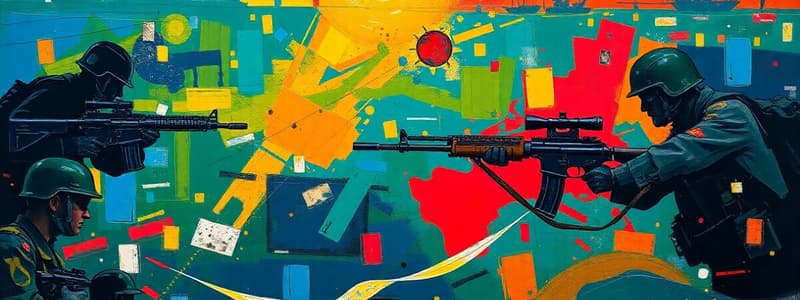Podcast
Questions and Answers
What was the main purpose of the mission on May 1, 2011?
What was the main purpose of the mission on May 1, 2011?
- To conduct a training exercise for the troops
- To establish a new base in Afghanistan
- To capture Osama bin Laden (correct)
- To support local Afghan communities
How did the author describe the atmosphere in the Tactical Operation Center?
How did the author describe the atmosphere in the Tactical Operation Center?
- Chaotic and loud with frequent discussions
- Silent and focused with individuals working intently (correct)
- Relaxed and casual among the personnel
- Distracted and careless about the mission
What emotion did Chris Faris express about the intelligence analysts?
What emotion did Chris Faris express about the intelligence analysts?
- Indifference towards their performance
- Nervousness about their capabilities
- Disappointment in their preparations
- Confidence in their expertise (correct)
What sensory details did the author use to describe the night air in Afghanistan?
What sensory details did the author use to describe the night air in Afghanistan?
What was the author’s emotional state as he prepared for the mission?
What was the author’s emotional state as he prepared for the mission?
What is the significance of the phrase "Who Dares Wins" in the context of the text?
What is the significance of the phrase "Who Dares Wins" in the context of the text?
Why did Faris pause before addressing the SEALs?
Why did Faris pause before addressing the SEALs?
What is the author's primary purpose in describing the extensive planning that went into the Osama bin Laden raid?
What is the author's primary purpose in describing the extensive planning that went into the Osama bin Laden raid?
What does the author mean when he states that "any fool can be cavalier with the lives, the money, the future of others, either in business or combat"?
What does the author mean when he states that "any fool can be cavalier with the lives, the money, the future of others, either in business or combat"?
What is the primary reason President Obama faced immense pressure regarding the Osama bin Laden mission?
What is the primary reason President Obama faced immense pressure regarding the Osama bin Laden mission?
Why is it mentioned that the compound in Abbottabad was close to Pakistani military and police facilities?
Why is it mentioned that the compound in Abbottabad was close to Pakistani military and police facilities?
Which of these aspects is NOT explicitly mentioned as a factor influencing the planning and execution of the Osama bin Laden raid?
Which of these aspects is NOT explicitly mentioned as a factor influencing the planning and execution of the Osama bin Laden raid?
What is the reason for the author's frustration towards the common perception of SEAL operations?
What is the reason for the author's frustration towards the common perception of SEAL operations?
According to the author, what is the central difference between a great leader and an average one?
According to the author, what is the central difference between a great leader and an average one?
What does the author mean by stating that “we tried to leave nothing to chance”?
What does the author mean by stating that “we tried to leave nothing to chance”?
Flashcards
Who was the target of Operation Neptune's Spear?
Who was the target of Operation Neptune's Spear?
The primary target of Operation Neptune's Spear was Osama bin Laden, the mastermind behind the 9/11 attacks.
Describe the team involved in Operation Neptune's Spear.
Describe the team involved in Operation Neptune's Spear.
The mission involved a coordinated effort of SEALs, intelligence analysts, and other military personnel, highlighting the complexity and coordination needed for such operations.
What made Operation Neptune's Spear a high-stakes mission?
What made Operation Neptune's Spear a high-stakes mission?
The operation was classified as high-stakes, implying that failure could have severe consequences, while success would have a significant impact.
Describe the atmosphere in the TOC before Operation Neptune's Spear launched.
Describe the atmosphere in the TOC before Operation Neptune's Spear launched.
Signup and view all the flashcards
What were the SEALs doing in the moments before launch?
What were the SEALs doing in the moments before launch?
Signup and view all the flashcards
Who Dares Wins
Who Dares Wins
Signup and view all the flashcards
Daring Greatly
Daring Greatly
Signup and view all the flashcards
Mission Planning and Preparation
Mission Planning and Preparation
Signup and view all the flashcards
Decision Making under Uncertainty
Decision Making under Uncertainty
Signup and view all the flashcards
Importance of Intelligence
Importance of Intelligence
Signup and view all the flashcards
Leadership and Motivation
Leadership and Motivation
Signup and view all the flashcards
Commando Mindset
Commando Mindset
Signup and view all the flashcards
Importance of Training
Importance of Training
Signup and view all the flashcards
Risk Assessment and Mitigation
Risk Assessment and Mitigation
Signup and view all the flashcards
Risk and Uncertainty are Inevitable
Risk and Uncertainty are Inevitable
Signup and view all the flashcards
Study Notes
Who Dares Wins: Study Notes
- Daring vs. Caution: A bold approach is preferable to a cautious one, especially in high stakes situations.
- Mission Overview (Operation Neptune's Spear): May 1, 2011 mission to capture Osama bin Laden in Abbottabad, Pakistan.
- Tactical Operation Center (TOC): Small, windowless room; filled with displays showing mission information; 20 people working on final mission instructions.
- Importance of Preparation: Planning and preparation (75% of mission time) crucial for risk mitigation.
- Intelligence Gathering: Extensive intelligence gathering on Pakistani defenses, police, military, terrain, weather, and bin Laden's compound was crucial to the mission.
- Mission Complexity: The mission involved high risk & uncertain intelligence. The president made a decision with only 50% confidence in the target's identity.
- Backup Plans: The mission plans addressed contingencies, as demonstrated by the backup helicopter that replaced a downed one. This pre-planning minimized risk and helped achieve mission success.
- Special Air Service (SAS) and "Who Dares Wins": The SAS motto, "Who Dares Wins," originates from a group of British commandos during World War II (led by David Stirling) known for stealthy, high-risk raids behind enemy lines.
- Leadership Qualities: Effective leaders are bold, but not reckless. They are prepared to take risks, mitigate those risks through planning, and learn from failures. Leaders who are timorous & fearful of failure are likely ineffective.
Risk Assessment and Mitigation
- Calculated Risk-Taking: Daring greatly means taking purposeful risks, not reckless ones.
- Planning and Preparation: Crucial for reducing risk to a manageable level.
- Contingency Planning: Addressing possible problems in advance (e.g. backup helicopter for potential crashes).
- Assessing Uncertainty: Acknowledging the role of chance and uncertainty in all missions while actively developing plans to deal with contingencies. The 50/100 confidence split of the president reflects the uncertain nature of the intelligence.
- Mission Success Factors: Success depends on thorough planning and preparation, a willingness to embrace calculated risks, and ensuring the skills of the executing team are matched to the risk level.
The Importance of Leadership
- Bold Leadership: Effective leaders are bold to inspire and drive action, especially in intimidating dangerous situations. Boldness is required to motivate team members when hesitation and fear may otherwise prevail.
- Foresight: Leaders must understand the risks involved in any decision so that they can properly assess and mitigate those risks.
- Difference between Bravery & Impudence: Bravery is a fine quality but impudence (recklessness) always leads to failure. Leaders must avoid recklessness.
- "Who Dares Wins" motto: Represents the bravery & leadership required in special operations missions.
Studying That Suits You
Use AI to generate personalized quizzes and flashcards to suit your learning preferences.
Description
Explore the key strategies and principles behind Operation Neptune's Spear, the mission to capture Osama bin Laden. This quiz covers daring versus cautious approaches, the significance of thorough preparation, and the complexities faced during the operation. Test your knowledge on the importance of intelligence gathering and contingency planning.




